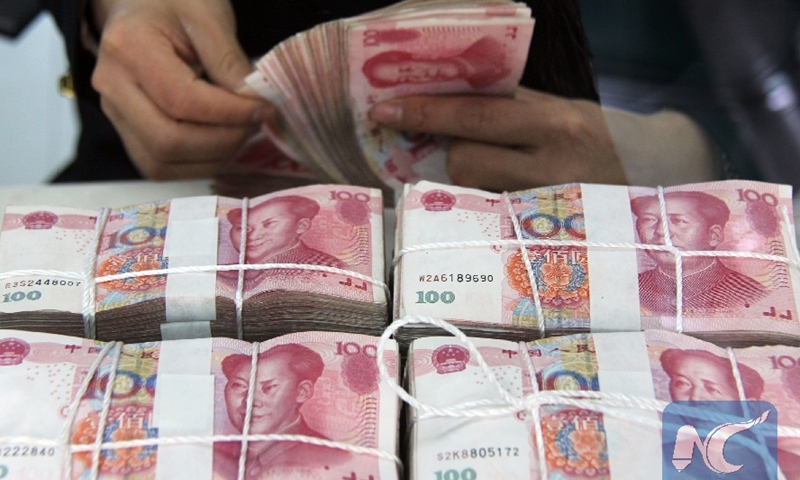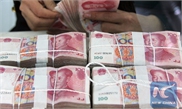
File Photo: A worker counts Chinese currency renminbi banknotes at a bank in Tancheng County of Linyi City, east China's Shandong Province, April 11, 2013. Photo:Xinhua
There may be signs of overshooting in the yuan's exchange rate, and the rapid appreciation of the Chinese currency is unsustainable and could hurt Chinese exporters, a former central bank official warned on Sunday.Separately, a commentary from Financial News, a publication under the People's Bank of China (PBC), also warned on Sunday that there are major depreciation pressures on the yuan that cannot be ignored.
With the US Federal Reserve phasing out its quantitative easing policy, there are chances of asset bubbles bursting, which might contribute to risk aversion globally. That would drive capital flows back to the US and shore up the dollar index, while weakening non-dollar currencies, read the commentary.
In an interview with Xinhua published earlier on Sunday, Sheng Songcheng, a former director of the financial survey and statistics department at the PBC said that the yuan has shown signs of overshooting against the US dollar in recent days, as misled by some inappropriate remarks.
The yuan's daily fixing hit 6.3858 against the dollar on Friday, the highest in three years, official data showed.
The yuan's strength against the greenback since the second half of last year was underpinned by the country's lead in containing the COVID-19 epidemic, and resuming work and production, as well as maintaining a conventional monetary policy compared with the prevalence of ultra-loose monetary conditions in other major economies, according to Sheng.
Meanwhile, China has become the top investment destination globally, with overseas investors substantially increasing holdings of yuan-denominated assets and thus shoring up the yuan's value, he continued.
These favorable factors were fully reflected in the strengthening of the yuan over the second half of 2020, he said.
The yuan's spot exchange rate rose 8.2 percent against the dollar in the second half of last year before stabilizing around the end of the year and hovering near 6.5.
The US dollar index initially rose this year before declining, shedding 2.2 percent over the past six weeks, while the euro strengthened 2.3 percent against the dollar and the Japanese yen fell 0.4 percent, Sheng noted. The yuan rose 2.9 percent against the dollar during the period.
The US dollar index is now lingering around 90 and is less likely to trend down as the US economy is rebounding more quickly than the European and Japanese economies.
In this situation, the yuan is expected to remain steady against the dollar, in accordance with market rules, the ex-PBC official said, explaining that the continued record-setting of the yuan against the dollar was a sign of overshooting.
The yuan's appreciation will hurt earnings at exporters, particularly small and medium-sized firms, Sheng commented, noting that businesses prefer a basically stable exchange rate to avoid the impact of currency fluctuations.
"The uptrend in the yuan's exchange rate would mean losses, as it's difficult to convince our clients of a proportional price hike," Liu Guoyi, general manager at Korra Bath Ware Co, a sanitary products maker that focuses on exports in Foshan, South China's Guangdong Province, told the Global Times.
Looking ahead, Sheng pointed out, the yuan's rapid appreciation isn't sustainable. A stronger yuan can't offset price hikes of major commodities and indicates short-term speculation, he stated.
Massive short-term capital inflows would strengthen the yuan even further, undermine exporters' competitiveness and disrupt the country's independent monetary policy.
In a research note sent to the Global Times over the weekend, economists with Zhixin Investment Research Institute reckon the yuan's value will fluctuate at about 6.4 to the dollar in June.


